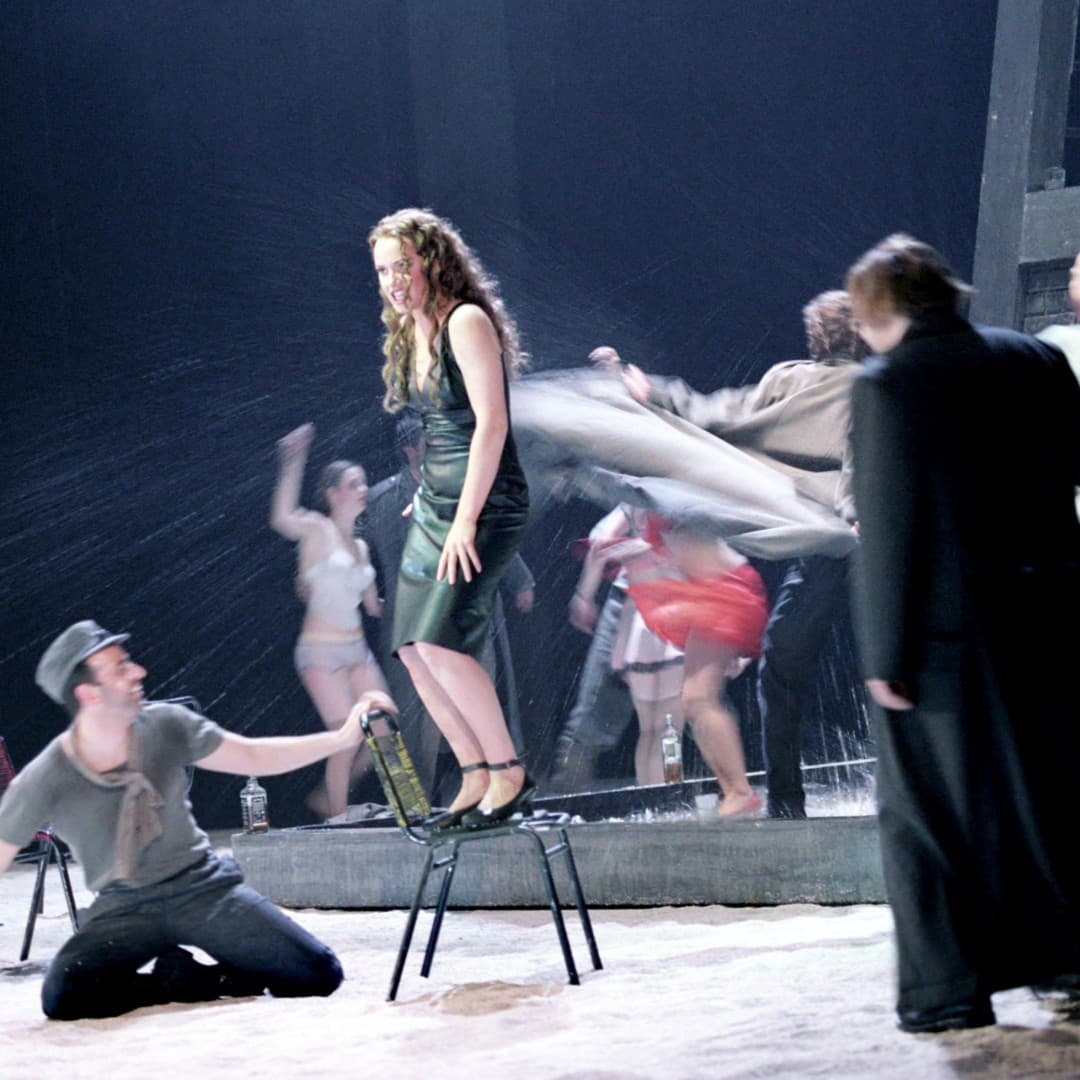Staatsoper Unter den Linden
Carmen
Opera
Unter den Linden 7, 10117 Berlin
Georges Bizet

© Monika Rittershaus
Description
An opéra comique with a tragic ending that depicts the eternal game of passion and torturous jealousy, and whose fiery music continues to appeal to audiences worldwide – that is Bizet’s Carmen. Idiosyncratic, memorable characters suffer the ultimately fatal consequences of their alternating attraction and repulsion.
Georges Bizet, whose opera Carmen was premiered in Paris in spring 1875, may have predicted the success of his opera, but he did not live to enjoy it. On its 33rd performance, he died, aged only 38. Today Carmen is one of the most frequently performed pieces in the repertoire, and there is no foreseeable end to its enthusiastic reception. It features a number of songs that have become true hits, while its southern flair and vivid orchestral sounds create a sensual mood, only adding to its charm. The music is ingeniously composed, corresponding to the opera’s dramatic events, and yet is catchy enough to be popular in the good sense. Each of the characters has an individual musical profile: the figures on stage are true to life, and their parts almost realistic, which adds to the credibility of their operatic performance. Bizet’s Carmen is a masterpiece in the repertoire of opera.
SYNOPSIS
Act one
A square with a guardhouse and a tobacco factory: soldiers are waiting in front of the factory for the women who work there to take their break. Sergeant Moralès approaches Micaëla, a girl from outside the city who is looking for her childhood sweetheart. When the soldiers start to make advances, Micaëla flees. Don José begins his guard duty while talking to Lieutenant Zuniga.
A bell announces the arrival of the women from the factory, and the soldiers and the women mingle on the square. One of them, Carmen, attracts Don José’s attention, and then disappears back into the factory with her fellow workers. Micaëla finds Don José and gives him a letter from his mother, who writes that she hopes he will marry Micaëla.
Shouts from the factory tear Don José away from his thoughts: Carmen has just wounded another factory girl with a knife in a fight. Carmen taunts Zuniga when he questions her, and he tells Don José to arrest her. Left alone with Carmen, Don José lets her persuade him to help her to escape.
Act two
At Lillas Pastia’s tavern: Moralès and Zuniga are enjoying a night at the tavern, along with Mercédès, Frasquita, and Carmen. Carmen rejects Zuniga’s advances, while the famous bullfighter Escamillo arouses her interest. Dancaïro and Remendado try to talk Carmen, Frasquita, and Mercédès into helping them smuggle contraband. Carmen turns them down to wait for Don José, who was demoted and thrown in jail for helping her to escape. Don José arrives, but is soon called back to the barracks when the bugles sound. Carmen is angry that he wants to leave. Don José confesses his love to her, but is unwilling to desert. She insists on her own idea of freedom. Zuniga suddenly bursts in and realizes that Carmen was waiting for Don José. The two rivals fight, and Don José decides to go with Carmen and her friends.
INTERMISSION
Act three
Rough surroundings: Don José is now living with the band of smugglers, and Carmen is talking about leaving him. Frasquita, Mercedes and Carmen are telling their fortunes with cards. When Carmen takes her turn, the cards foretell death for her and Don José. When the smugglers Remendado and Dancaïro set off, Don José is to guard the contraband. Micaëla has followed him into the mountains, but misses him by just a few minutes. Escamillo, looking for Carmen, encounters Don José. Don José challenges Escamillo to a fight, which is interrupted only by the return of the women and the smugglers. Remendado discovers Micaëla hiding. She tells Don José that his mother is dying, and Don José decides to leave with her.
Act four
The square in front of the bullring: Carmen and Escamillo are now together. Frasquita and Mercédès warn Carmen that Don José has returned. Don José begs Carmen to start over with him, but Carmen no longer loves him. Don José stabs her to death.
---
Carmen - Opéra comique by Georges Bizet
Libretto by Henri Meilhac and Ludovic Halévy after the novel by Prosper Mérimée
In French language with German and English surtitles
Georges Bizet, whose opera Carmen was premiered in Paris in spring 1875, may have predicted the success of his opera, but he did not live to enjoy it. On its 33rd performance, he died, aged only 38. Today Carmen is one of the most frequently performed pieces in the repertoire, and there is no foreseeable end to its enthusiastic reception. It features a number of songs that have become true hits, while its southern flair and vivid orchestral sounds create a sensual mood, only adding to its charm. The music is ingeniously composed, corresponding to the opera’s dramatic events, and yet is catchy enough to be popular in the good sense. Each of the characters has an individual musical profile: the figures on stage are true to life, and their parts almost realistic, which adds to the credibility of their operatic performance. Bizet’s Carmen is a masterpiece in the repertoire of opera.
SYNOPSIS
Act one
A square with a guardhouse and a tobacco factory: soldiers are waiting in front of the factory for the women who work there to take their break. Sergeant Moralès approaches Micaëla, a girl from outside the city who is looking for her childhood sweetheart. When the soldiers start to make advances, Micaëla flees. Don José begins his guard duty while talking to Lieutenant Zuniga.
A bell announces the arrival of the women from the factory, and the soldiers and the women mingle on the square. One of them, Carmen, attracts Don José’s attention, and then disappears back into the factory with her fellow workers. Micaëla finds Don José and gives him a letter from his mother, who writes that she hopes he will marry Micaëla.
Shouts from the factory tear Don José away from his thoughts: Carmen has just wounded another factory girl with a knife in a fight. Carmen taunts Zuniga when he questions her, and he tells Don José to arrest her. Left alone with Carmen, Don José lets her persuade him to help her to escape.
Act two
At Lillas Pastia’s tavern: Moralès and Zuniga are enjoying a night at the tavern, along with Mercédès, Frasquita, and Carmen. Carmen rejects Zuniga’s advances, while the famous bullfighter Escamillo arouses her interest. Dancaïro and Remendado try to talk Carmen, Frasquita, and Mercédès into helping them smuggle contraband. Carmen turns them down to wait for Don José, who was demoted and thrown in jail for helping her to escape. Don José arrives, but is soon called back to the barracks when the bugles sound. Carmen is angry that he wants to leave. Don José confesses his love to her, but is unwilling to desert. She insists on her own idea of freedom. Zuniga suddenly bursts in and realizes that Carmen was waiting for Don José. The two rivals fight, and Don José decides to go with Carmen and her friends.
INTERMISSION
Act three
Rough surroundings: Don José is now living with the band of smugglers, and Carmen is talking about leaving him. Frasquita, Mercedes and Carmen are telling their fortunes with cards. When Carmen takes her turn, the cards foretell death for her and Don José. When the smugglers Remendado and Dancaïro set off, Don José is to guard the contraband. Micaëla has followed him into the mountains, but misses him by just a few minutes. Escamillo, looking for Carmen, encounters Don José. Don José challenges Escamillo to a fight, which is interrupted only by the return of the women and the smugglers. Remendado discovers Micaëla hiding. She tells Don José that his mother is dying, and Don José decides to leave with her.
Act four
The square in front of the bullring: Carmen and Escamillo are now together. Frasquita and Mercédès warn Carmen that Don José has returned. Don José begs Carmen to start over with him, but Carmen no longer loves him. Don José stabs her to death.
---
Carmen - Opéra comique by Georges Bizet
Libretto by Henri Meilhac and Ludovic Halévy after the novel by Prosper Mérimée
In French language with German and English surtitles
Cast
Valentin Uryupin
Musical Director
Martin Kušej
Director
Katharina Lang
Szenische Einstudierung, Spielleitung
Tabatha McFadyen
Spielleitung
Jens Kilian
Set Design
Heidi Hackl
Costumes
Reinhard Traub
Light
Gaëlle Arquez
Carmen
Ivan Gyngazov
Don José
Łukasz Goliński
Escamillo
Jaka Mihelač
Dancaïro
Andrés Moreno García
Remendado
Roman Trekel
Moralès
Jan Martiník
Zuniga
Clara Nadeshdin
Micaëla
Rebecka Wallroth
Mercédès
Maria Kokareva
Frasquita
Sébastien Dutrieux
Lillas Pastia
Staatsopernchor
Kinderchor der Staatsoper
Staatskapelle Berlin
Staatsoper Unter den Linden
Unter den Linden 7, 10117 Berlin
To enable Google Maps please accept functional cookies.

